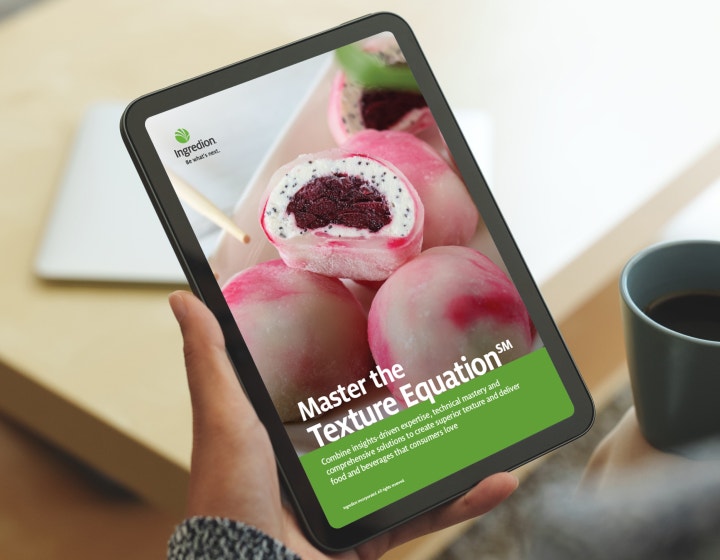
Mouthfeel solutions
When innovation meets consumer preference
Mouthfeel contributes to texture-driven satisfaction
Consider a freshly baked baguette — we enjoy it because it’s crispy on the outside and soft on the inside. We crave a perfectly ripened peach because it’s mouthwateringly juicy. And we indulge in chocolate mousse because it’s decadently creamy.
Texture and mouthfeel play pivotal roles in defining the eating and drinking experience, influencing not just consumer satisfaction, but also product acceptability. For instance, starches break down faster in saliva than hydrocolloids, which influences texture perception and the release of flavors and tastes.
According to our 2024 Texture Research study:

79% of consumers agree that texture impacts the overall satisfaction of their eating experience
Source: Ingredion1
8 in 10 consumers will likely recommend a food product based on its texture
Source: Ingredion1

Texture can make or break the consumer experience. Understanding the connection between them is key for brands to formulate products that are delicious, memorable and win.
But achieving the right texture — especially while balancing factors like nutrition, sugar reduction and clean-label requirements — is a challenge for many brands. It involves navigating complex sensory factors, from the macroscopic structure of foods to microscopic interactions at the molecular level.
That's why Ingredion developed the Texture EquationSM. Combining insights-driven expertise, technical mastery and comprehensive solutions, we can help you overcome your manufacturing challenges and unlock the ultimate sensory experience to differentiate your brand and drive market success.

E-book: Master the Texture EquationSM
Download our e-book to learn about the essential role of texture in shaping eating experiences and explore category-specific insights and applications.
Key ingredients that influence mouthfeel

Emulsifiers
Emulsifiers improve mouthfeel by ensuring the stability of different liquids, such as oil and water. They play a key role in maintaining smooth and consistent textures in products like dressings and sauces.

Texture solutions
Texturants create different textures in food and beverage for better eating and drinking experiences. Enhance mouthfeel by modifying viscosity and creaminess with starches, hydrocolloids and more.

Stabilizers and thickeners
Stabilizers and thickeners prevent clotting or settling while enhancing viscosity, consistency and overall product appearance. They may also improve stability and extend the shelf life of products.
Webinar: Elevating healthier products through texture innovation
Join Ingredion as our experts discuss consumer insights related to texture and its role in the development of healthier food and beverage options. We'll also explore practical examples of how our technical and sensory expertise can help you formulate products with texture characteristics that provide a superior eating experience for consumers.

Mouthfeel is an integral component of complex texture solutions
While critical, mouthfeel represents just one layer of the broader sensory profile afforded by texture. For example, a breakfast bar taken on the go might taste great, but if it crumbles too easily and creates a mess in the car during a consumer's morning commute, they might decide it's not worth the hassle and avoid the product altogether.
A multifaceted sensory term, mouthfeel encompasses oral-tactile texture characteristics — from the initial contact through swallowing — capturing key attributes such as hardness, grittiness, thickness, fatty richness and sensations like astringency and burn.2
Texture, however, covers a wider array of properties, including measurable parameters like hardness, chewiness, crispiness and crumble. It also integrates additional sensory cues such as visual appearance and auditory feedback, resulting in a complete profile of a product’s physical and structural attributes. The International Organization for Standardization describes texture as all mechanical, geometrical and surface characteristics perceived by tactile, visual and auditory receptors.3
At Ingredion, our advanced expertise lies in engineering robust texture solutions that deliver precise mouthfeel while calibrating all sensory dimensions. Our comprehensive approach enhances product performance and consumer satisfaction by ensuring that every element — from tactile nuances in the mouth to the overall structural integrity — is meticulously optimized.
Why does mouthfeel matter?
Imagine the contrast between smooth, velvety chocolate and chocolate that is rough and grainy. One is undeniably crave-worthy, while the other is distinctly off-putting.
Mouthfeel is a key driver of sensory satisfaction, playing a critical role in shaping how consumers perceive and experience their food and beverages. Attributes like creaminess, smoothness and consistency can enhance or detract from product enjoyment, directly impacting consumer preference. Getting it right, however, can be tricky. The ingredient makeup of a food product can affect sensory perceptions in the mouth considerably. Factors include:
- Physical state of the ingredient (liquid, solid, etc.)
- Reactions to processing conditions
- Interactions with other ingredients in the formulation
- Amount/volume
- Concentration
- Particle size
Ingredion's trusted sensory and ingredient solutions experts help brands develop products that not only taste good, but also deliver the ideal eating experience — driving satisfaction, brand loyalty and market success.
Types of mouthfeel

Smooth and creamy
Consumers expect rich, smooth and creamy textures in products like sauces, soups and yogurts. Consistently create indulgent mouthfeel with Ingredion’s range of texturants, even in plant-based alternatives.

Crispy and crunchy
From chips and snacks to fried chicken and french fries, find the right texturants to deliver the crisp and crunch that consumers want.

Light and airy
Deliver the airy, delicate texture that consumers love in whipped cream and mousses — or add a refreshing fizz in carbonated beverages to set them apart.

Thick and full-bodied
Create rich, comforting sensations in soups and sauces with the right thickening texturants.
Create the mouthfeel your consumers love with Ingredion
Describing something as “crispy” may seem simple and intuitive, but achieving that perfect crisp is far from easy. Mouthfeel is a complex sensory experience that’s influenced by many different factors— from macroscopic and microscopic food structures to intermolecular and intramolecular interactions.
External factors like texture, temperature, moisture content and the way food interacts with saliva impact the overall eating experience as well. To achieve the ideal crisp, crunch, stretch and chew, a deep understanding of these elements and their interplay is essential.
Ingredion's trusted sensory and ingredient solutions experts help brands develop products that not only taste good, but also deliver the ideal eating experience — driving satisfaction, brand loyalty and market success.
Our ingredient solutions include:
- Modified starches: Derived from corn, tapioca, potato and rice, starches play a key role in enhancing mouthfeel, providing essential textural properties like thickening, gelling and stabilizing to improve a product’s creaminess, smoothness and consistency
- Hydrocolloids: Ingredients like gellan gum, carrageenan, guar gum and xanthan gum thicken, stabilize and provide smooth textures in products across a wide range of categories — from bakery and beverages to dairy and dairy alternatives
- Soluble fibers: Ingredients like tapioca fiber and inulin enhance creaminess and viscosity, making them ideal for replicating dairy-like mouthfeel in non-dairy alternatives, all while offering digestive health benefits
- Proteins: Plant-based proteins, such as pea protein, deliver superior solubility and dispersibility for a smooth and creamy mouthfeel, making them a great choice for dairy alternatives
- Emulsifiers: Ingredients like modified starches and gum acacia help stabilize emulsions, improving texture and mouthfeel in products like beverages, ice creams and dressings
- Fat replacers: Ingredients that mimic the mouthfeel of fat, including maltodextrin and polydextrose, provide creamy textures without adding extra calories
Mouthfeel at work across food and beverage categories

Bakery and snacks
Achieve the perfect crunch, chew and crispness in baked goods and snacks, including low-fat and low-sodium alternatives.

Beverages
Deliver the ideal smoothness, creaminess or lightness that consumers desire, even in sugar-reduced or clean label smoothies and coffees.

Dairy and plant-based dairy
Give consumers the permissive indulgence they crave with rich, smooth and creamy dairy and plant-based dairy products.

Soups, sauces and gravies
Create satisfying, simple soups, sauces and gravies that will keep your customers coming back for more.
Partner with Ingredion to create superior eating experiences that boost product appeal
Guided by market trends and proprietary insights, Ingredion uses cutting-edge technologies to help you achieve your texture goals quickly. Our team of experts will collaborate with you to solve your most pressing mouthfeel challenges, drawing from the latest innovations in our global Ingredion Idea Labs® network.
With Ingredion, you’ll be able to implement our advanced ingredient solutions designed to help you deliver formulations that meet your business’s specific needs and drive greater consumer appeal.
Mouthfeel FAQ
1. How can I improve the mouthfeel of my product?
Mouthfeel can be enhanced by using a variety of texturants — ingredients specifically designed to create distinct textures in food and beverages. These texturants help achieve desired sensory experiences and texture profiles, directly impacting consumer preference and satisfaction.
2. What are the main ingredients that affect mouthfeel?
Key ingredients include modified starches, hydrocolloids, soluble fibers, proteins, emulsifiers and fat replacers. Each of these ingredients plays a specific role in shaping mouthfeel and texture — from enhancing creaminess and viscosity to providing fullness and smoothness.
3. How does Ingredion develop mouthfeel solutions?
At Ingredion, our comprehensive approach begins in our 32 global Ingredion Idea Labs®, outfitted with advanced tools to measure and optimize parameters such as texture, viscosity and rheology. This rigorous analysis allows us to engineer precise mouthfeel attributes — those immediate sensations that shape the initial consumer impression. However, we recognize that mouthfeel is only one critical layer of a product's broader sensory profile.
Texture, in its entirety, encompasses a range of measurable properties — including hardness, chewiness and crispiness — that drive overall consumer perception and product performance. By quantifying these attributes, we not only fine-tune the direct sensations in the mouth, but also address the complete textural profile that ultimately matters to consumers.
Utilizing science-driven methodologies and proprietary approaches such as the Texture Equation™, we design advanced formulations that harmonize mouthfeel with the comprehensive texture experience. This holistic strategy ensures that our innovative solutions meet market trends and consumer preferences, reinforcing Ingredion’s commitment to delivering full-spectrum texture solutions that drive product success.
4. Can Ingredion help with custom solutions?
Yes! At Ingredion, we have an ecosystem of experts and partners ready to formulate and deliver optimized formulations tailored to your unique needs.
Win on the shelf with the ideal mouthfeel
Let Ingredion’s sensory experts guide you in creating consumer-preferred products that drive business growth and success.
1 Ingredion proprietary texture consumer research, 2024
2 Oral processing, texture and mouthfeel: From rheology to tribology and beyond, ScienceDirect, 2013
3 Sensory analysis — Methodology — Texture profile, International Organization for Standardization (ISO), 2019